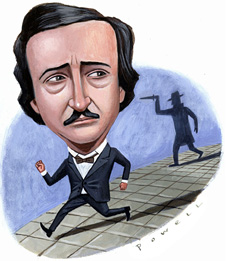Uniquely talented Matthew Pearl has produced another New York Times Bestseller in The Poe Shadow. After reading his previous thrilling work of literary historical fiction in The Dante Club, I couldn’t wait to see what else this novelist had up his sleeve. I was sad though that circumstances beyond my control have caused a 7-month delay of finishing this much desired book when I started it way back in January. Finally reaching the last page, I can know add it to my blog.
Quentin Clark is an attorney of 1849 Baltimore where news of Edgar Allan Poe’s death has shocked him, even if no one else had cared. After becoming a fan of this widely unknown writer, Clark began a correspondence with Poe to work as a legal aid in clearing his name of the false press statements about Poe’s drunken habits. Once Poe ends up dead under mysterious circumstances, Quentin Clark continues the work he promised Poe to make sure people know the truth about Poe’s life and death. This proves more difficult than expected under the conditions and Quentin must seek outside help. Mr. Clark decides to travel to France in order to find the real life inspiration for Poe’s dramatic mystery hero, C. Auguste Dupin. Since there are multiple possibilities believed for this inspiration, it becomes a contest to figure out the truth of Poe’s death first in order to prove which one is the real Dupin of “The Murders in the Rue Morgue” and “The Purloined Letter.” Quentin’s devotion leads to the diminishing of his law practice as well as his romantic relationship with an almost fiancé as he tries to deal with issues involving the popularly rising temperance movement, the Baltimore slave trade and even international conspiracies and assassination attempts. The investigation of one death leads to another and Quentin begins the telling of his story on trial.
Matthew Pearl’s novel is interesting enough during adventure sequences, but sadly these are rare. From crawling in hospital tunnels meant for dead bodies in order to eavesdrop on information, to hanging on the ledge of a city monument to evade French mobsters, those portions of the story are captivating and action packed. (There is even a swordfight!) The details in Pearl’s writings are what make him a great storyteller, but in The Poe Shadow, their use can also cause his downfall. There is much information and back-story that goes into planning a mystery-thriller, yet the presentation of these necessary facts is mainly involved with two men sitting and talking to each other. These back-stories are highly creative and crucial to the novel, but the explaining dialogue scenes appear too frequently for my taste. Forty percent of the time the conversation is about what has happened in the past, the other sixty percent is about what might have happened in the past and why they think so. The reader finds him or herself forcing the continued reading, waiting for the next enjoyable scene from Pearl’s fantastic pen (or keyboard) that eventually comes but fades too quickly into yet another dialogue of the previous events. There is no doubt that Pearl possesses a unique talent for historical fiction that serves him well and will most likely continue to do so (maybe in his 2009 The Last Dickens). It was the triumph of making it through the novel to the end that makes it possible for me to praise the book as a whole, even though some specific story-telling characteristics during the process appear wildly unattractive.
The Poe Shadow is a beautifully written piece of work that earns Matthew Pearl gold stars for originality, creativity, voice and style. It is a brilliant piece and stands on its own but there is the general feeling that it might have stood a little taller with a few changes. As it is, it surely would be next to nothing without Pearl’s previous success with The Dante Club that drew me and, I’m sure, others like me to his piece. I would recommend this novel to fans of Matthew Pearl, fans of Edgar Allan Poe, fans of mystery thrillers or fans of historical pieces.
“It is well to read everything of something, and something of everything.”
- Lord Henry P. Brougham


